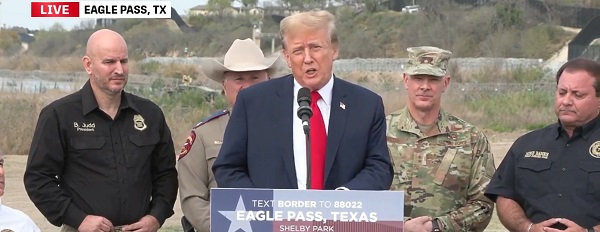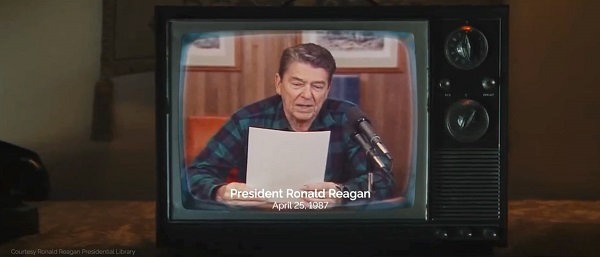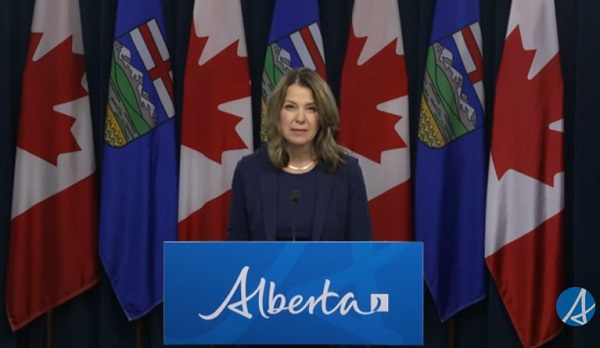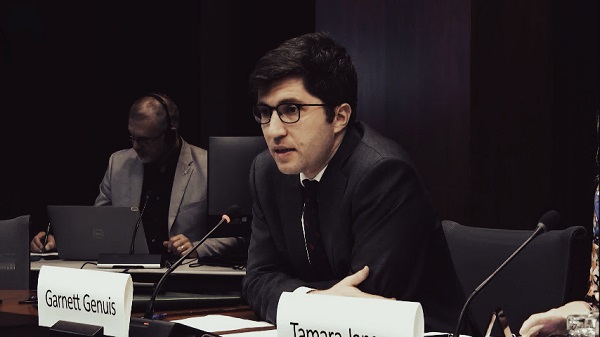Daily Caller
Trump Reportedly Has Ace Up His Sleeve For Countries That Refuse To Take Back Their Illegal Migrants


From the Daily Caller News Foundation
By Jason Hopkins
The incoming Trump administration is reportedly devising a plan to remove illegal migrants from the United States, even if their home countries refuse to accept them.
Illegal migrants that have been ordered deported by an immigration judge, but hail from a country that refuses to take them back, may be sent to Turks and Caicos, the Bahamas, Grenada, Panama or possibly elsewhere once President-elect Donald Trump returns to the White House, according to NBC News. Such a plan, which has yet to be confirmed by the transition team, could prove to be a game-changer in the president-elect’s promised goal of conducting the largest deportation initiative in U.S. history.
It’s not immediately clear if these illegal migrants would be allowed to remain and work in the countries in which they are deported, or what type of pressure Trump officials are applying to these host governments. A spokesperson for the Trump transition team did not respond to a request for comment from the Daily Caller News Foundation.
Foreign governments that refuse to take back deportees have long frustrated federal immigration authorities in multiple administrations. In lieu of remaining in detention indefinitely, many of these individuals may simply be released back into the U.S., even if an immigration judge has ordered them to be removed.
Under the Biden administration, federal immigration authorities and major cities across the country experienced an unprecedented illegal immigration crisis. Management of this crisis was made more difficult when Venezuela, the second-highest source of illegal immigration into the U.S., stopped accepting deportation flights in February.
Nearly 8 million Venezuelans have fled the country under Venezuelan President Nicolas Maduro, a leftist authoritarian who has overseen rampant inflation, economic turmoil and political repression. Trump is reportedly being pushed to make a deal with Maduro’s government, which would involve them accepting deportees again in exchange for an easing of U.S. sanctions, but it’s not clear if the incoming president is receptive to such an idea.
In the past, the Chinese and Cuban governments have also proven uncooperative with deportation flights from the U.S. However, both countries have begun accepting more flights from Immigration and Customs Enforcement (ICE) once again.
During Trump’s first White House term, he secured safe third country agreements with El Salvador, Guatemala and Honduras, which were intended to keep asylum seekers at bay by forcing them to seek refuge in those countries first before applying in the U.S. However, the Biden administration suspended those deals immediately upon entering office — part of a massive unraveling of Trump-era immigration policies by President Joe Biden that helped spark the current southern border crisis.
Trump plans to enter office and begin to not only conduct the largest deportation program ever witnessed in U.S. history, but he has also vowed to resume border wall construction, end birthright citizenship for those born to illegal migrant parents, restart the travel ban and bring back the Remain in Mexico program — which kept asylum seekers waiting in Mexico while their claims were adjudicated in immigration court.
Business
‘TERMINATED’: Trump Ends Trade Talks With Canada Over Premier Ford’s Ronald Reagan Ad Against Tariffs


From the Daily Caller News Foundation
President Donald Trump announced late Thursday that trade negotiations with Canada “ARE HEREBY TERMINATED” after what he called “egregious behavior” tied to an Ontario TV ad that used former President Ronald Reagan’s voice to criticize tariffs.
The ad at the center of the feud was funded by Ontario Premier Doug Ford’s government as part of a multimillion-dollar campaign running on major U.S. networks. The spot features Reagan warning that tariffs may appear patriotic but ultimately “hurt every American worker and consumer.”
Dear Readers:
As a nonprofit, we are dependent on the generosity of our readers.
Please consider making a small donation of any amount here.
Thank you!
“They only did this to interfere with the decision of the U.S. Supreme Court, and other courts. TARIFFS ARE VERY IMPORTANT TO THE NATIONAL SECURITY, AND ECONOMY, OF THE U.S.A,” Trump wrote on his Truth Social platform late Thursday. “Based on their egregious behavior, ALL TRADE NEGOTIATIONS WITH CANADA ARE HEREBY TERMINATED.”
Ford first posted the ad online on Oct. 16, writing in a caption, “Using every tool we have, we’ll never stop making the case against American tariffs on Canada. The way to prosperity is by working together.”
The Ronald Reagan Presidential Foundation and Institute criticized the ad Thursday evening, saying it “misrepresents” Reagan’s 1987 radio address on free and fair trade. The foundation said Ontario did not request permission to use or alter the recording and that it is reviewing its legal options.
The president posted early Friday that Canada “cheated and got caught,” adding that Reagan actually “loved tariffs for our country.”
The ad splices audio from Reagan’s original remarks but includes his authentic statement: “When someone says, ‘let’s impose tariffs on foreign imports’, it looks like they’re doing the patriotic thing by protecting American products and jobs. And sometimes, for a short while it works, but only for a short time.”
Reagan also noted at the end of his remarks that, in “certain select cases,” he had taken steps to stop unfair trade practices against American products and added that the president’s “options” in trade matters should not be restricted, which the ad did not include.
Since returning to the White House, Trump has imposed tariffs on Canadian aluminum, steel, automobiles and lumber, arguing they are vital to protecting U.S. manufacturing and national security.
The Supreme Court is set to hear arguments in November over whether the administration overstepped its authority by invoking the International Emergency Economic Powers Act to impose reciprocal tariffs on dozens of nations, including Canada. Tariffs on commodities such as steel, aluminum and copper were implemented under Section 232 of the Trade Expansion Act and are not currently being challenged, as they align with longstanding precedent established by prior administrations.
Thursday’s move marks the second time this year Trump has canceled trade talks with Ottawa. In June, he briefly halted discussions after Canada imposed a digital services tax on American tech firms, though the Canadian government repealed the measure two days later.
Carbon Tax
Back Door Carbon Tax: Goal Of Climate Lawfare Movement To Drive Up Price Of Energy


From the Daily Caller News Foundation
The energy sector has long been a lightning rod for policy battles, but few moments crystallize the tension between environmental activism and economic reality quite like David Bookbinder’s recent admission. A veteran litigator who’s spent years spearheading lawsuits against major oil companies on behalf of Colorado municipalities — including Boulder — Bookbinder let the cat out of the bag during a recent Federalist Society panel.
In an all-too-rare acknowledgement of the lawfare campaign’s real goal, Bookbinder admitted that he views the lawsuits mainly as a proxy for a carbon tax. In other words, the winning or losing of any of the cases is irrelevant; in Bookbinder’s view, the process becomes the punishment as companies and ultimately consumers pay the price for using oil and gas and the industry’s refined products.
“Tort liability is an indirect carbon tax,” Bookbinder stated plainly. “You sue an oil company, an oil company is liable. The oil company then passes that liability on to the people who are buying its products … The people who buy those products are now going to be paying for the cost imposed by those products. … [This is] somewhat of a convoluted way to achieve the goals of a carbon tax.”
Dear Readers:
As a nonprofit, we are dependent on the generosity of our readers.
Please consider making a small donation of any amount here.
Thank you!
The cynicism is so thick you could cut it with a knife.
On one hand, the fact that winning is irrelevant to the plaintiff firms who bring the cases has become obvious over the last two years as case after case has been dismissed by judges in at least ten separate jurisdictions. The fact that almost every case has been dismissed on the same legal grounds only serves to illustrate that reality.
Bookbinder’s frank admission lands with particular force at a pivotal juncture. In late September, the Department of Justice, along with 26 state attorneys general and more than 100 members of Congress, urged the Supreme Court to grant certiorari in one of the few remaining active cases in this lawfare effort, in Boulder, Colorado.
Their briefs contend that allowing these suits to proceed unchecked would “upend the constitutional balance” between federal and state authority, potentially “bankrupt[ing] the U.S. energy sector” by empowering local courts to override national energy policy.
For the companies named in the suits, these cases represent not just a tiresome form of legal Kabuki Theater, but a financial and time sink that cuts profits and inhibits capital investments in more productive enterprises. You know, like producing oil and gas to meet America’s ravenous energy needs in an age of explosive artificial intelligence growth.
“I’d prefer an actual carbon tax, but if we can’t get one of those, and I don’t think anyone on this panel would [dis]agree Congress is likely to take on climate change anytime soon—so this is a rather convoluted way to achieve the goals of a carbon tax,” Bookbinder elaborated in his panel discussion.
John Yoo, the eminent UC Berkeley law professor and former Bush-era official, didn’t hold back in his analysis for National Review. He described the lawfare campaign as a “backdoor” assault on the energy industry, circumventing the federal government’s established role in environmental regulation.
“There are a variety of cities and states that don’t agree with the federal government, and they would like to see the energy companies taxed,” Yoo explained. “Some of them probably like to see them go out of business. Since they can’t persuade through the normal political process of elections and legislation like the rest of the country, they’re using this back door,” he added.
What we see in action here is the fact that, although the climate alarm industry that is largely funded by an array of dark money NGOs and billionaire foundations finds itself on the defensive amid the aggressive policy actions of the Trump 47 administration, it is far from dead. Like the Democrat party in which they play an integral role, the alarmists are fighting the battle in their last bastion of power: The courts.
As long as there are city and county officials willing to play the role of plaintiffs in this long running Kabuki dance, and a Supreme Court unwilling to intercede, no one should doubt that this stealth carbon tax lawfare effort will keep marching right along.
-

 Business1 day ago
Business1 day ago$15B and No Guarantees? Stellantis Deal explained by former Conservative Shadow Minister of Innovation, Science and Technology
-

 Health20 hours ago
Health20 hours agoFor Anyone Planning on Getting or Mandating Others to Get an Influenza Vaccine (Flu Shot)
-

 Alberta1 day ago
Alberta1 day agoPremier Smith moves to protect Alberta in International Agreements
-

 Business20 hours ago
Business20 hours agoLiberals backtrack on bill banning large cash gifts, allowing police to search Canadians’ mail
-

 Agriculture1 day ago
Agriculture1 day agoFrom Underdog to Top Broodmare
-

 Sports19 hours ago
Sports19 hours ago‘We Follow The Money’: Kash Patel Says Alleged NBA Ties To Mafia Just ‘The Start’ Of FBI Investigation
-

 Alberta2 days ago
Alberta2 days agoAlberta’s licence plate vote is down to four
-

 Bruce Dowbiggin2 days ago
Bruce Dowbiggin2 days agoIs The Latest Tiger Woods’ Injury Also A Death Knell For PGA Champions Golf?




